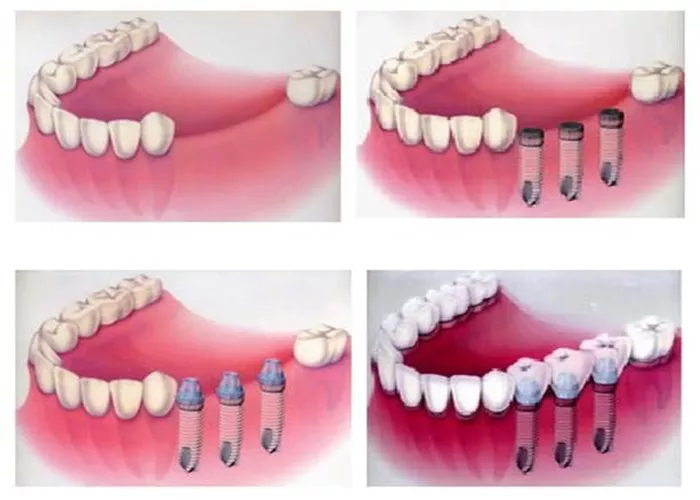In modern dentistry, dental implants have emerged as a reliable solution for restoring missing teeth. This procedure not only enhances the aesthetic appearance of the smile but also improves chewing function and dental health. However, like any surgical procedure, dental implants involve certain risks and potential complications. In this article, we will explore whether dental implants are risky, addressing various aspects of the procedure, potential complications, and measures to minimize these risks.
Understanding Dental Implants
Dental implants are artificial tooth roots made of titanium or other biocompatible materials. They are surgically placed into the jawbone to support a replacement tooth or bridge. The success of dental implants largely depends on the integration of the implant with the surrounding bone tissue, a process known as osseointegration. Once osseointegration is achieved, the implant provides a stable foundation for the restoration of missing teeth.
Risks and Complications Associated with Dental Implants
While dental implants are generally considered safe and effective, they do involve some risks and potential complications.
These risks can be broadly categorized into surgical risks, post-operative risks, and long-term risks.
1. Surgical Risks
Bleeding and Infection: During the surgical procedure, there is a risk of bleeding and infection. Proper pre-operative and post-operative antibiotic therapy, as well as strict aseptic techniques, can help minimize these risks.
Nerve Damage: The surgical site may be close to important nerves, such as the inferior alveolar nerve in the mandible or the superior alveolar nerve in the maxilla. If these nerves are damaged during surgery, patients may experience numbness, tingling, or pain in the affected area. Nerve damage is usually temporary, but in some cases, it can be permanent.
Fracture of Bone: In rare cases, the jawbone may fracture during the implant placement process. This risk is higher in patients with weak or fragile bones, such as those with osteoporosis or advanced periodontal disease.
2. Post-Operative Risks
Pain and Swelling: Post-operative pain and swelling are common side effects of dental implant surgery. These symptoms can be managed with pain medication, ice packs, and proper rest.
Implant Failure: In some cases, the implant may fail to integrate with the jawbone, leading to implant failure. This can occur due to various factors, such as poor bone quality, infection, or improper implant placement. If an implant fails, it may need to be removed and replaced with a new one.
Sinus Problems: In the upper jaw, the implants may be placed close to the sinus cavity. If the sinus membrane is perforated during surgery, it can lead to sinusitis or other sinus-related problems. Proper surgical technique and the use of sinus augmentation procedures can help minimize this risk.
3. Long-Term Risks
Peri-Implantitis: This is an inflammatory condition that affects the tissues around the implant. It can lead to bone loss and implant failure if not treated promptly. Regular dental check-ups and professional cleaning can help prevent peri-implantitis.
Implant Loosening: Over time, the implant may become loose due to bone loss or other factors. This can cause discomfort and affect the function of the restoration. If the implant becomes loose, it may need to be removed and replaced.
Allergic Reactions: Although rare, some patients may experience allergic reactions to the materials used in dental implants, such as titanium or zirconia.
Factors Influencing the Risk of Dental Implants
The risk of dental implants varies from patient to patient, depending on various factors such as age, overall health, bone quality, and smoking habits.
Age and Overall Health: Younger patients with good overall health tend to have a lower risk of complications compared to older patients or those with systemic diseases such as diabetes, heart disease, or autoimmune disorders.
Bone Quality: Patients with dense and healthy jawbone tissue have a higher chance of successful osseointegration compared to those with poor bone quality. In patients with insufficient bone volume, bone augmentation procedures such as sinus augmentation or bone grafting may be required to increase the success rate of implants.
Smoking Habits: Smoking is a major risk factor for dental implant failure. It impairs blood circulation and delays healing, increasing the risk of infection and implant failure. Quitting smoking before and after the surgery can significantly improve the outcome of dental implants.
Minimizing the Risks of Dental Implants
To minimize the risks associated with dental implants, patients and dentists can take several precautions and measures.
Choose a Qualified Dentist: It is crucial to choose a dentist who is experienced and specialized in dental implant surgery.
Look for a dentist who has completed advanced training in implant dentistry and has a good track record of successful cases.
Follow Pre-Operative Instructions: Patients should follow all pre-operative instructions provided by the dentist, such as avoiding certain medications, quitting smoking, and maintaining good oral hygiene.
Undergo Comprehensive Evaluation: Before the surgery, patients should undergo a comprehensive evaluation to assess their bone quality, overall health, and dental needs. This helps the dentist to determine the best treatment plan and minimize potential risks.
Post-Operative Care: Proper post-operative care is essential for the success of dental implants. Patients should follow the dentist’s instructions for pain management, diet, and oral hygiene. Regular follow-up appointments are also necessary to monitor the healing process and address any potential complications.
Conclusion
In conclusion, dental implants involve certain risks and potential complications, but they are generally considered safe and effective when performed by a qualified dentist and with proper care and follow-up. By understanding the risks associated with dental implants and taking appropriate measures to minimize them, patients can achieve successful outcomes and enjoy the benefits of restored teeth. It is important to note that every patient is unique, and the risks associated with dental implants may vary depending on individual factors. Therefore, it is crucial to consult with a qualified dentist to assess your specific situation and determine the best treatment plan for you.
Related topics:

